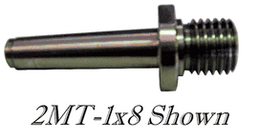I recently bought two new 1/4x8 inserts through Amazon.
Before that I an insert from Buffalo Woodturning, listed as in stock.
It came in good condition at a reasonable price but took
15 days to arrive:
Ordered on Sept 7
Paypal transaction was Sept 8
Shipped on Sept 17
Delivered on Sept 22
Ok if not in a hurry, I guess. Maybe they were having some problems, don't know. I saw no communication from them indicating a a stocking problem or a delay.
If ordering from Buffalo maybe call first to confirm stock and expected delivery time :
Joe@buffalowoodturningproducts.com
When inserts became available on Amazon again i ordered a couple of spares for just in case. As a shipping comparison, I ordered two inserts on Oct 31 and they were delivered Nov 2 -
2 days to arrive.
I also bought several new SN2 chucks from Amazon to replenish my chuck drawers. I'm now back to over 20 chucks. Can't have too many chucks (depending on how you work.) I don't change jaws.
I use the set screw to hold the insert to the chuck but NEVER use the set screw to hold the insert to the lathe spindle. Not needed for the way I mount chucks and work. All chucks I've every purchased came with both set screws and two allen wrenches. The inserts came with no set screws. BTW, I never use the allen wrenches - prefer T-handle allen wrenches.
I lock the chuck to the lathe spindle with my "callibrated" wrist flick.
I always remove the chuck from the lathe spindle with a Nova chuck wrench, bumped with my hand. NEVER by striking a chuck key (I think that's asking for trouble.)
I don't buy direct-threaded chucks after the first one - I have my reasons.
Here is something I've discovered about Nova inserts. They were all easy to insert and remove BUT I was unhappy with the precision. I always clean off any burrs on the threads, install the insert, then check the runout with a dial indicator (I used these in SN2 chucks). MOST of the chuck/insert combination are not as precise as they could be. Inserted out of the little box, I usually see a runout of 0.002 or 0.003". One was even much worse. They can do better than that.
Not counting the threads on the insert or in the chuck, there are two places on the insert that can introduce error - 1) on the surface that mates with the flat on the chuck spindle, and 2) on the end of the threads that are inserted into the chuck. I've put some inserts on a surface plate and checked with a Starrett height gauge with a dial test indicator to measure the extent of any imprecision - can't get much more precise than that in a home machine shop.
However, I haven't found any imprecision yet Ii couldn't easily fix. I first mount the insert on the lathe spindle backwards and dress the flat on the end that will eventually seat against the lathe spindle. For this I use a small carbide cutting tool held firmly flat on a box rest and held by hand - the one I use is mounted in a tool holder from my metal lathe, but a hand held straight or pointed carbide bit of any type should work. Sandpaper on a sanding stick or a good file held firmly will also work.
After the mating end is flat, I reverse the insert to expose the end that seats in the chuck. This end is often the problem. Again, I dress that end with a carbide cutting bit until it's perfectly flat, then smooth with a file and/or sanding sticks. Debur that if needed, clean, and insert into the chuck.
After adjustment, the runout on all of my "sloppy" SN2 chucks
has gone from 0.003 down to 0.0005. This is more precision than needed for woodturning but at least I know I need to blame any problems on me instead of the chuck!
All this makes me think that the inserts are not being made to as precise standards as possible, BUT they can easily be tuned if I want more precision. Also, in discussing this with others, some feel that the unmodified runout of 0.003 is fine for a woodturning chuck.
JKJ


